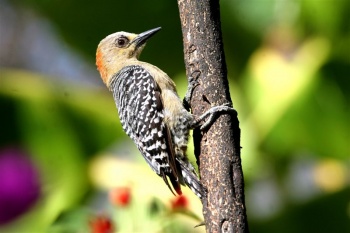m (caption on 2nd photo seems incorrect - this is the female) |
(→External Links: New combined GSearch. GSearch checked template) |
||
| (2 intermediate revisions by 2 users not shown) | |||
| Line 1: | Line 1: | ||
| − | [[Image:Red-crowned-woodpecker by michha62.jpg|thumb|550px|right|Photo by {{user|michha62|michha62}} <br/>Location: San Anton El Valle, [[Panama]] <br/> Male ]] <!--- Comment: the previous photo by reini is likely to have shown a female of hybrid origin. I chose not to replace with another female because at this time I did not find a nice photo of one ---> | + | [[Image:Red-crowned-woodpecker by michha62.jpg|thumb|550px|right|Photo © by {{user|michha62|michha62}} <br/>Location: San Anton El Valle, [[Panama]] <br/> Male ]] <!--- Comment: the previous photo by reini is likely to have shown a female of hybrid origin. I chose not to replace with another female because at this time I did not find a nice photo of one ---> |
;[[:Category:Melanerpes|Melanerpes]] rubricapillus | ;[[:Category:Melanerpes|Melanerpes]] rubricapillus | ||
==Identification== | ==Identification== | ||
| Line 8: | Line 8: | ||
From the Tarcoles area of [[Costa Rica]] and south through [[Panama]], [[Colombia]], [[Venezuela]], the [[Guianas]] and [[Tobago]] (but absent on [[Trinidad]]); in Costa Rica and western Panama limited to the Pacific slope. | From the Tarcoles area of [[Costa Rica]] and south through [[Panama]], [[Colombia]], [[Venezuela]], the [[Guianas]] and [[Tobago]] (but absent on [[Trinidad]]); in Costa Rica and western Panama limited to the Pacific slope. | ||
==Taxonomy== | ==Taxonomy== | ||
| − | [[Image:3287Red-Crowned_Woodpecker_Graffton_by_Gallus.jpg|thumb|350px|right|Photo by {{user|Gallus|Gallus}} <br/>Grafton estate, [[Tobago]] <br/> | + | [[Image:3287Red-Crowned_Woodpecker_Graffton_by_Gallus.jpg|thumb|350px|right|Photo © by {{user|Gallus|Gallus}} <br/>Grafton estate, [[Tobago]] <br/> Male ]] |
Four subspecies are recognized<sup>[[#References|[1]]]</sup>: | Four subspecies are recognized<sup>[[#References|[1]]]</sup>: | ||
*''M. r. rubricapillus'' | *''M. r. rubricapillus'' | ||
| Line 26: | Line 26: | ||
{{ref}} | {{ref}} | ||
==External Links== | ==External Links== | ||
| − | {{GSearch|Melanerpes | + | {{GSearch|"Melanerpes rubricapillus" {{!}} "Red-crowned Woodpecker"}} |
| + | {{GS-checked}}1 | ||
| + | <br /> | ||
| + | <br /> | ||
| + | |||
[[Category:Birds]] [[Category:Melanerpes]] | [[Category:Birds]] [[Category:Melanerpes]] | ||
Latest revision as of 22:03, 19 August 2023
- Melanerpes rubricapillus
Identification
20.5 cm long and weigh 48g. Barred black and white back and wings and a white rump. The tail is black with some white barring, and the underparts are pale buff-brown. The male has a red crown patch and nape. The female has a buff crown and reddish nape (see variation below).
Variation
In Costa Rica near Tarcoles River, the presence of birds with orange napes are presumed to be caused by hybridization with Hoffmann's Woodpecker. In the South American part of the range, the red on the nape is much reduced in both the male and the female, lacking completely in the Paraguaná Peninsula of western Venezuela and Colombia (subspecies M. r. paraguanae).
Distribution
From the Tarcoles area of Costa Rica and south through Panama, Colombia, Venezuela, the Guianas and Tobago (but absent on Trinidad); in Costa Rica and western Panama limited to the Pacific slope.
Taxonomy
Four subspecies are recognized[1]:
- M. r. rubricapillus
- M. r. subfusculus
- M. r. seductus
- M. r. paraguanae
Habitat
Forests and semi-open woodland and cultivation.
Behaviour
It nests in a hole in a dead tree or large cactus. 2 eggs are laid and incubated by both sexes; the young fledge after 31-33 days.
Its diet includes insects, fruit and nectar.
References
- Clements, JF. 2010. The Clements Checklist of Birds of the World. 6th ed., with updates to December 2010. Ithaca: Cornell Univ. Press. ISBN 978-0801445019. Spreadsheet available at http://www.birds.cornell.edu/clementschecklist/Clements%206.5.xls/view
- Garrigues and Dean 2007. The birds of Costa Rica - a field guide. Cornell University Press. ISBN 978-0-8014-7373-9
- Restall et al. 2006. Birds of Northern South America. Yale University Press. ISBN 9780300124156
Recommended Citation
- BirdForum Opus contributors. (2024) Red-crowned Woodpecker. In: BirdForum, the forum for wild birds and birding. Retrieved 24 June 2024 from https://www.birdforum.net/opus/Red-crowned_Woodpecker
External Links
GSearch checked for 2020 platform.1





